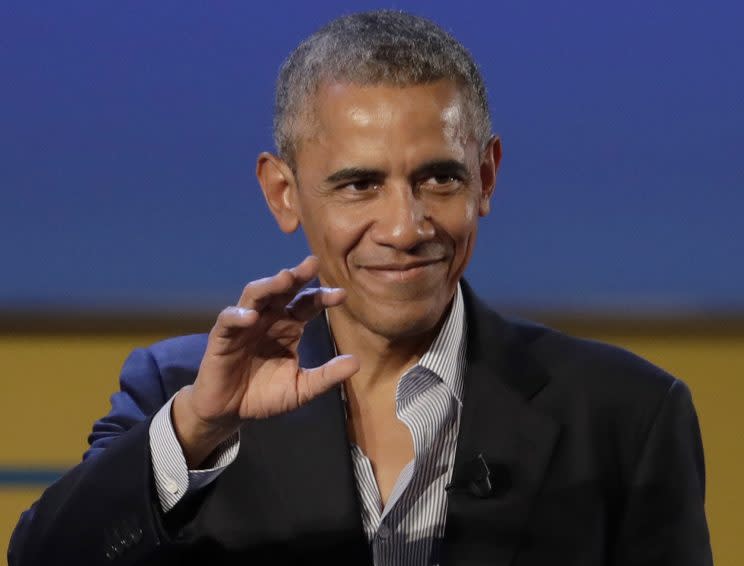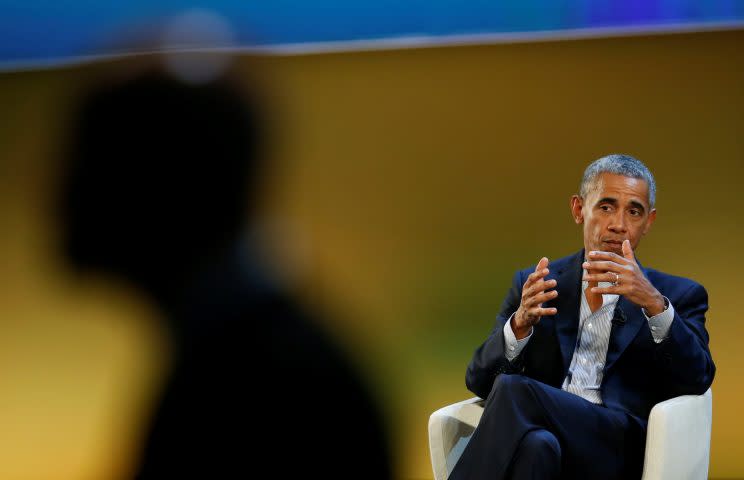Obama on climate change: Let’s talk about our food

Former President Barack Obama addressed the impact of food production on climate change — and why this connection isn’t discussed more.
Obama spoke about the often under-publicized link between food production and greenhouse gas emissions during the Global Food Innovation Summit in Milan on Tuesday.
During an on-stage conversation with his former chef Sam Kass, Obama said that people naturally understand that big smokestacks emit pollution, so they can easily grasp the link between energy production and greenhouse gases, the most significant driver of anthropogenic climate change.
But the connection between what’s on your dinner plate and what’s happening to the environment is not as readily apparent, he suggested.
“People aren’t as familiar with the impact of cows and methane, unless you’re a farmer. Then you know what takes place there. Some of it is just lack of knowledge in the general public. Now keep in mind, it took a long time to educate people around climate change and we still have a lot of work to do.”
Various scientific studies have found that eating less meat would greatly reduce our carbon footprint but that most people are not aware of this. Some environmentalists advocate following plant-based diets for this very reason.
Obama said another reason it’s difficult to incorporate food consumption into our conversations about climate change is that it’s a “very emotional issue.” Before arriving at the conference, Obama said, he stopped by the Santa Maria delle Grazie church to see Leonardo da Vinci’s “The Last Supper” mural, one of the world’s most famous paintings.

“So even in our religion and our art, food is important,” Obama said. “Because food is so close to us and part of our families and what we do every single day, people are more resistant to the idea of government or bureaucrats telling us how to eat, what to eat, how to grow, etc. Some of it is that resistance.”
Obama also said the agricultural communities in every country are very strong and that Republicans and Democrats from agricultural states usually come together to protect the interests of food producers in the U.S. He said the economic interests of these food producers need to be taken into account and that family farms are generally happy to adopt new systems that produce food more efficiently with fewer greenhouse gas emissions, as long as they don’t lose money.
“If what they see is that you’re putting environmental issues as a priority over their economic interests, then they’ll resist. And that’s true in advanced countries. It’s also true in poor countries,” Obama said.
Both Obama and Kass said that the onus for environmentally conscious food creation cannot fall entirely on the producers — consumers are the other half of the equation. Kass pointed out that beef is the largest emissions driver from the agriculture industry.
During a lighthearted moment, Kass joked that they both love steaks and that he may have cooked Obama thousands of steaks during their time together.
“I don’t know about thousands,” Obama said.
“Well, hundreds maybe. I’ve been cooking for you for 10 years.”
“I’m trying to count,” Obama said. “What is true is I am not a vegetarian. I respect vegetarians, but I’m not one of them.”
He said the key to climate-friendly food consumption is giving people good information, especially concerning healthful eating.
The uneven distribution of food throughout the world also contributes to a difficult political dynamic for discussing this issue, but there has been some progress, Obama said. One challenge, he continued, is that quickly developing countries with rising incomes consume more meat.
“That doesn’t mean we can’t teach you and me to have a smaller steak for our own health. It doesn’t mean we can’t make progress in educating the advanced world about the need to reduce just for dietary reasons the amount of meat that we consume at any given meal, particularly if it’s wasted,” Obama said.
“But what it does mean is that we’re also going to need to find ways to produce protein in a more efficient way, and that’s where some of the technology that comes in at this conference will be really important.”
Read more from Yahoo News:



